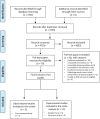Efficacy of a low-FODMAP diet in adult irritable bowel syndrome: a systematic review and meta-analysis
- PMID: 33585949
- PMCID: PMC8354978
- DOI: 10.1007/s00394-020-02473-0
Efficacy of a low-FODMAP diet in adult irritable bowel syndrome: a systematic review and meta-analysis
Erratum in
-
Correction to: Efficacy of a low-FODMAP diet in adult irritable bowel syndrome: a systematic review and meta-analysis.Eur J Nutr. 2021 Sep;60(6):3523. doi: 10.1007/s00394-021-02620-1. Eur J Nutr. 2021. PMID: 34181070 Free PMC article. No abstract available.
Abstract
Purpose: This review provides an updated overview of observational and intervention studies investigating the effect of a low-FODMAP (fermentable oligo-, di- and monosaccharides, and polyols) diet (LFD) on gastrointestinal (GI) symptoms, quality of life (QoL), nutritional adequacy, and gut microbiome in irritable bowel syndrome (IBS) patients.
Methods: We systematically searched available literature until October 2020 for studies that investigated the effect of LFDs on GI symptoms, QoL, nutritional adequacy, and the gut microbiome in IBS patients. The data were represented as standardized mean differences (SMD) for IBS severity, and as mean differences (MD) for IBS-QoL. Meta-analyses were performed for the quantitative analyses using random effects models with inverse variance weighing.
Results: Twelve papers (nine parallel trials, three crossover studies) were included for the meta-analysis. The LFD reduced IBS severity by a moderate-to-large extent as compared to a control diet (SMD - 0.66, 95% CI - 0.88, - 0.44, I2 = 54%). When analyzing only studies that used the validated IBS-SSS questionnaire, a mean reduction of 45 points (95% CI - 77, - 14; I2 = 89%) was observed. Subgroup analyses on adherence, age, intervention duration, IBS subtype, outcome measure, and risk of bias revealed no significantly different results. The LFD also increased IBS-QoL scores, when compared with a control diet (MD 4.93; 95% CI 1.77, 8.08; I2 = 42%).
Conclusions: The low-FODMAP diet reduces GI symptoms and improves quality of life in IBS subjects as compared to control diets. Future work is required to obtain definitive answers regarding potential long-term effects of such diets on nutritional adequacy and the gut microbiome.
Prospero registration number: CRD42020175157.
Keywords: Exclusion diet; Gastrointestinal symptoms; Irritable bowel syndrome; Low-FODMAP diet.
© 2021. The Author(s).
Conflict of interest statement
Unilever is a company that manufactures food and beverages, of which some may be considered low-FODMAP.
Figures





References
Publication types
MeSH terms
Substances
LinkOut - more resources
Full Text Sources
Other Literature Sources

